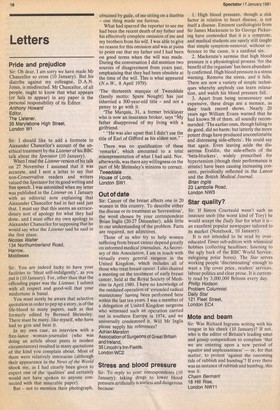Pride and prejudice
Sir: Oh dear, I am sorry we have made Mr Chancellor so cross (10 January). But his diatribe against my colleague, D.A.N. Jones, is misdirected. Mr Chancellor, of all people, ought to know that what appears (or fails to appear) in any paper is the personal responsibility of its Editor. Anthony Howard Editor, The Listener, 35 Marylebone High Street, London W1 Sir: I should like to add a footnote to Alexander Chancellor's account of the unethical treatment by the Listener of his BBC talk about the Spectator (10 January).
When I read the Listener version of his talk on 27 November I assumed that it was accurate, and I sent a letter to say that non-Conservative readers and writers valued the Spectator for its good writing and free speech. I was astonished when my letter was published in the Listener on 1 January with an editorial note explaining that Alexander Chancellor had in fact said just that. I must say that this seems an extraordinary sort of apology for what they had done, and I must offer my own apology to Alexander Chancellor for supposing that he would say what the Listener said he said in the first place.
Nicolas Walter 134 Northumberland Road, Harrow, Middlesex Sir: You are indeed lucky to have your facilities to 'bleat self-indulgently', as you put it (10 January). For, other than that the offending paper was the Listener, I submit with all respect and good-will that your misfortune is banal.
You must surely be aware that selective quotation in order to pep up a story, is of the life-blood to many papers, such as that formerly edited by Bernard Shrimsley. There must be many, like myself, who have had to grin and bear it.
In my own case, an interview with a free-lance woman-journalist (who was doing an article about peers in modest circumstances) resulted in many quotations of the kind you complain about. Most of them were relatively innocuous (although their appearance in the News of the World shook me, as I had clearly been given to expect one of the 'qualities' and certainly would not have spoken to anyone connected with that miserable paper).
But not to mention their photograph, obtained by guile, of me sitting on a dustbin one thing made me furious.
What had spurred the reporter to see me had been the recent death of my father and his effectively complete omission of me and my brothers from his will. I was able to give no reason for this omission and was at pains to point out that my father and I had been on good terms when the will was made. During the conversation I did mention two sources of disagreement from years past, emphasising that they had been obsolete at the time of the will. This is what appeared (N.o.W., 8 April 1979): 'The thirteenth marquis of Tweeddale (family motto: Spare Nought) has just inherited a 300-year-old title and not a penny to go with it.
'The Marquis, 31, a former bricklayer who is now an insurance broker, says "My father disapproved of my living with a girlfriend.
' "He was also upset that I didn't use the title of Earl of Gifford as his eldest son." ' There was no qualification of these 'remarks', which amounted to a total misrepresentation of what I had said. Nor, afterwards, was there any willingness on the part of Mr Shrimsley's minions to correct. Tweeddale House of Lords, London SW1


































 Previous page
Previous page